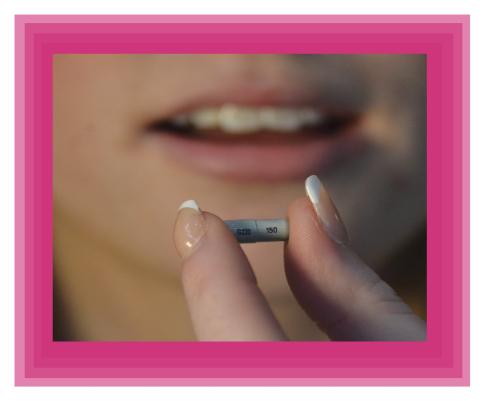Medicated
West students reflect on their experiences taking medication for mental disorders.

West students discuss how taking medication for ADHD, anxiety and depression has impacted their lives.
Roughly 20% of adolescents aged 12-17 in Iowa were medicated for “difficulties with emotions, concentration or behavior,” according to the 2018-2019 National Survey of Children’s Health. Adjusting to life on medication involves determining the right dosage and drug, tolerating side effects and navigating the stereotypes and misconceptions that accompany being medicated.
Olivia Harris ’23, who takes Zoloft for depression and buspirone for anxiety, requires medication to simply feel normal.
“[Taking medication is] just a way that some people have to exist, what they have to do to be able to operate how they want … in a way that they feel represents them and allows them to do the things they love and want,” Harris said.
Prescribing medication
Approximately half of children and teens in the U.S. with mental health disorders were untreated or did not receive necessary care or counseling from a healthcare professional, according to a 2016 University of Michigan study. Dr. Kerri Husman, a psychiatrist at Vitality Psychiatry in Iowa City, cites a shortage of healthcare providers in Iowa as the primary reason young adults struggle with access to necessary mental health treatments.
“When the National Alliance for Mental Illness has rated different states, [Iowa has] scored an F multiple times, and it’s primarily because of the shortage of providers,” Husman said. “There’s generally an under treatment [of mental disorders], whether it be not seeking therapy or not being allowed to seek therapy, or not seeking medication management.”
Before being treated with medication, patients must be diagnosed with a specific disorder by a medical professional. This often entails clinical interviews, screening tools and psychological testing.
“[Getting diagnosed] was a lot. I had to talk to my therapist, my doctor, the University, but the wait list [at the University of Iowa hospital] was a mile long, so then [I] had to go to a separate establishment with a shorter wait list,” Harris said. “But then, it was also hard because it’s not just through the hospital.”
Grace Vignato ’26, who takes medication for ADHD, anxiety and depression, also agrees that the process of receiving the diagnosis required for a prescription can be lengthy and complex.
“It’s a very long process. It’s not easy because they can’t just be handing out medications like candy on Halloween,” Vignato said. “First you have to get your diagnosis, which the waiting list can take anywhere from a month to a year.”
Despite the barriers to receiving a diagnosis, Husman stresses the importance of obtaining a clinical diagnosis and doctor-sanctioned prescription for mental disorders instead of relying solely on self-diagnosing.
“We all have quirks. That is being human. That does not mean we have a disorder causing impairment across multiple situations and circumstances. This is why a careful assessment with a licensed provider is essential,” Husman said. “That’s why [psychiatrists] go to school for 13 years, instead of being subscribed to TikTok.”
Once a patient is diagnosed with a mental disorder, determining the proper medication and dosage requires psychiatrists to consider a patient’s family history, medical risk factors and previous prescriptions. Patients may try multiple different prescriptions before finding the right fit. The first medication Vignato tried to treat her depression actually worsened her suicidal ideation.
“Most people don’t have any side effects. Whereas, [in] my case, it caused me to become more suicidal. So I wasn’t on that one for very long,” Vignato said.
Even once the right medication has been prescribed, finding an ideal dosage can involve constant adjustment. For Harris, their medication was slowly bumped up in 50-milligram increments until they reached a place where their medication worked as intended. Quinn Abbott ’24 has been taking methylphenidate and guanfacine since age seven for both ADHD and ADD. Unlike Harris, he has decreased his dosage over time.
“As I’ve gotten older, we’ve lowered the dosage. I [now] have more control over myself and I’ve gotten more mature,” Abbott said. “I’ve gone from an insanely high dosage to a pretty low dosage.”
Husman describes how titrating, or changing medication dosage to obtain a patient’s optimized response, is an involved process that varies by drug.
“Sometimes [titrating] is very complex, it takes a long time. Sometimes it’s very simple because some meds can be stopped abruptly. Other meds have to be carefully very slowly titrated,” Husman said. “It’s a really wide range, and some meds require blood work and monitoring.”
Living with medication
Although medication can be essential to teens’ wellness and health, it comes with misconceptions about what living with it is like.
“A lot of people think that antidepressants make you happy, and they don’t, they just make you, for lack of a better term, normal. They make you less irrationally sad,” Harris said.
Harris has found her medication to be successful in mitigating negative emotions, which is a primary reason that they have continued to take it.
“I only feel that intense, emotional distress when I’m off [my medications], and I feel normal when I’m on them,” Harris said. “That’s what to me is the biggest sign that yes, they do work, they do make a difference.”
Vignato also notices when she doesn’t take her medication, negative side effects culminate into situations that feel uncontrollable.
“It is [hard to function without medication] because with anxiety and depression, I’m not motivated to do a lot of things … I’m worried that I’m not gonna get my grades turned in. [With] my depression, I don’t have the motivation to even attempt to do the assignments, and to turn [them] in [for] my grades,” Vignato said.
Abbott finds that taking medication is worth it due to the stability it provides him.
“The days that I don’t [take medication], those tend to not be the greatest days. I’m crazy energetic but then get to a point in the day where I get really quiet and get irritated easily,” Abbott said.
Harris has gone through cycles of feeling better and wanting to go off medication but ultimately have realized it is responsible for helping them feel better.
“I go off [medication] and then I decline a lot. My family and friends notice and usually that ends up culminating in a big problem with a lot of emotional distress,” Harris said. “It’s only at that point I realized, ‘Oh, this is because I haven’t taken my meds and this is what life has been like before I was on them.’”
Though it can be a struggle to maintain regular habits of taking medication, Harris believes its benefits outway the inconveniences.
“The results [of not taking my medication] were, for lack of a better term, disastrous,” Harris said. “I’m much better and happier and can operate at a desirable level on the medication. If that’s what I have to do for the rest of my life to operate at a good level, then I’m okay with that.”
In addition to taking medication, there are other coping strategies Harris employs.
“I definitely don’t [agree with] the idea that you can just take medication and go be fine. I don’t believe that,” Harris said. “I think that you definitely need to have intervention on multiple fronts.”
Apart from medication, Harris meets with a therapist and psychiatrist, along with practicing Dialectical Behavioral Therapy, or DBT.
“[DBT focuses on] reframing and mindfulness,” Harris said. “One of the big things that they talked about is identifying what you’re feeling, acknowledging that and respecting that feeling and then letting it go, and not getting stuck on things.”
Stigmas surrounding medication
In elementary school, when Vignato first considered taking medication to treat her anxiety and depression, she was against the option because she didn’t want to be different and judged by her peers.
“When I was younger, I didn’t want anyone to know I was using medication because I felt like I was the only one,” Vignato said. “There’s honestly no reason to be ashamed. [Medication] has helped me significantly, and I’ve been able to improve a lot. There’s going to be ups and downs … but once you find the right medication that works for you, it improves your life significantly.”
Vignato has noticed that the stigma surrounding taking medication has lessened as she’s grown older, partly due to a better understanding of mental disorders. Additionally, Harris believes having mental health concerns taken seriously by healthcare professionals has also been key to destigmatizing mental disorders.
“The difference is that people who are mentally ill are living longer, not just being seen as crazy and locked away, and are actually taken seriously and given a space to be helped,” Harris said. “[Health care professionals] will medicate people instead of trying to wait as long as possible and then see that [a patient] actually cannot continue on [unmedicated].”
In the 1950s, over 500,000 Americans occupied state psychiatric institutions, oftentimes for life. Today, that number has dropped to around 37,000, with most psychiatric beds being used for short-term, acute inpatient care in medical hospitals. Some, including Husman, have seen changes like these made possible by the lessened stigma surrounding mental health struggles. Husman finds that when public figures are open about their mental health struggles, it helps alleviate the shame surrounding seeking help.
“Every time a known person, like an athlete, political figure or entertainer, speaks up about their mental health care and takes time away to improve their health, it helps diminish the stigma,” Husman said. “It normalizes it for the average person who’s not one of those things and [helps them] realize it’s okay to get treatment.”
Husman holds that the societal stigma around caring for mental health can be exacerbated by families who don’t support mental health treatment and believe that mental disorders are a character deficit. Although Harris’ parents are now supportive of her mental health, they were initially wary.
“At first my parents were a little hesitant about the idea of being mentally ill. They were very much raised in a culture of not taking mental illness seriously,” Harris said. “But it was when a close family member of mine was really struggling … [that] they realized this is an actual thing that’s serious.”
Vignato thinks that even though the discussion of mental health disorders has become more prevalent, students can still be fearful of asking for help, as they may be met with accusations of faking their distress for attention.
“Saying, ‘Oh, you’re just doing it for attention and that’s why we’re not going to support you,’ I find it horrific,” Vignato said. “I find that a lot of students at West High face that from adults.”
Abbott acknowledges that although some who take medication may not receive the support they need, he has been fortunate enough to be supported by both his parents and friends.
“In my case, it’s been only support. My friends get on me if I forget my medication, and my parents have been supportive,” Abbott said. “They all know that [my medication] helps me to be a better version of myself.”
Harris echoes that taking medication is what some people must do to be their preferred version of themselves and emphasizes that it should not be seen as a big deal.
“We are all different people. And we’ll all do and need different things to be ourselves and people should just recognize it,” Harris said. “Not stigmatize it, not glorify it, just normalize it and move on.”
Your donation will support the student journalists of West High School. Your contribution will allow us to purchase Scholarship Yearbooks, newsroom equipment and cover our annual website hosting costs.

(she/her) Lilly Graham is a senior at West, and this is her third year on staff. Lilly is the Managing Editor for the print edition. Outside of school,...

Marie Stier is a senior at West, and this is her third year on staff. She is the Co-Editor-in-Chief for WSS Print. Outside of journalism, Marie spends...

(she/her) Ginger McCartney is currently a senior at West, this is her third year on staff. She is the art editor for the West Side Story paper. Outside...



